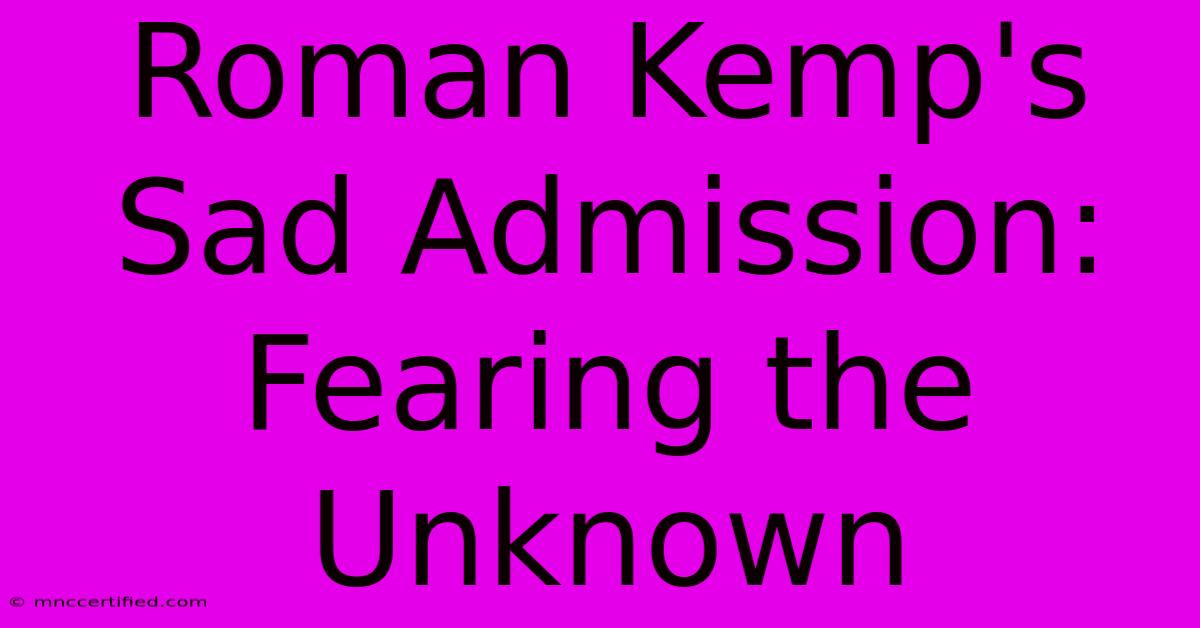Roman Kemp's Sad Admission: Fearing The Unknown

Table of Contents
Roman Kemp's Sad Admission: Fearing the Unknown – A Deeper Dive into Mental Health
Roman Kemp, the beloved Capital Breakfast host and television personality, recently shared a deeply personal admission about his struggles with anxiety and the fear of the unknown. This candid revelation has resonated with countless fans and sparked important conversations surrounding mental health, particularly the often-overlooked anxieties surrounding uncertainty. This article delves into Kemp's admission, explores the nature of this fear, and offers insights into coping mechanisms.
Understanding Roman Kemp's Vulnerability
Kemp's openness about his mental health is commendable. In a society that often stigmatizes mental illness, his willingness to share his struggles helps normalize the experience and encourages others to seek help. His admission wasn't just about fearing the unknown; it was about acknowledging the vulnerability inherent in the human experience. He bravely exposed the fragility even successful individuals can face, highlighting the universality of mental health challenges. This vulnerability is key to connecting with his audience on a deeply personal level, strengthening his brand and image as relatable and authentic.
The Fear of the Unknown: A Common Anxiety
The fear of the unknown, or atavistic anxiety, is a primal human response. Our brains are wired to seek safety and predictability. Uncertainty triggers the amygdala, the part of the brain responsible for processing fear and emotions. This response manifests in different ways, from mild unease to crippling anxiety, impacting various aspects of life. For many, this fear can manifest as:
- Generalized Anxiety Disorder (GAD): Excessive worry about everyday events.
- Panic Attacks: Sudden surges of intense fear, accompanied by physical symptoms.
- Social Anxiety: Intense fear of social situations and scrutiny.
- Specific Phobias: Irrational fears of specific objects or situations.
Roman Kemp's experience likely intersects with some of these anxieties, highlighting how the fear of the unknown can manifest in complex ways.
Coping Mechanisms: Navigating Uncertainty
While the fear of the unknown is a natural human response, it doesn't have to control our lives. There are effective coping mechanisms that can help manage and reduce anxiety:
1. Mindfulness and Meditation:
Practicing mindfulness allows us to focus on the present moment, reducing the power of future anxieties. Meditation techniques can help calm the mind and reduce racing thoughts. Mindfulness apps are readily available and can guide beginners through the process.
2. Cognitive Behavioral Therapy (CBT):
CBT is a widely used therapeutic approach that helps individuals identify and challenge negative thought patterns. It's particularly effective in managing anxiety disorders by teaching coping skills and reframing negative thoughts.
3. Physical Activity and Exercise:
Exercise releases endorphins, which have mood-boosting effects. Regular physical activity can significantly reduce stress and anxiety levels. Finding an activity you enjoy, whether it's running, yoga, or team sports, is crucial for maintaining a consistent routine.
4. Building a Support System:
Sharing your feelings with trusted friends, family, or a therapist can provide invaluable support. Open communication is crucial for reducing feelings of isolation and seeking help when needed.
5. Setting Realistic Expectations:
The pursuit of perfection can fuel anxiety. Setting realistic goals and accepting imperfections can significantly reduce stress and anxiety.
The Importance of Open Dialogue
Roman Kemp's bravery in sharing his struggles is a powerful example of the importance of open dialogue surrounding mental health. His admission serves as a reminder that mental health challenges are not unique to any one individual. By normalizing these experiences, we can create a more supportive and understanding environment for everyone.
Keywords: Roman Kemp, anxiety, fear of the unknown, mental health, coping mechanisms, mindfulness, CBT, support system, vulnerability, generalized anxiety disorder, panic attacks, social anxiety, specific phobias, mental wellbeing, celebrity mental health
Off-Page SEO Strategies:
- Social Media Engagement: Share the article across various social media platforms, engaging with followers and encouraging discussion around Roman Kemp's admission and mental health awareness.
- Guest Posting: Reach out to relevant blogs and websites focused on mental health and entertainment news to offer this article as a guest post.
- Outreach to Influencers: Connect with mental health influencers and advocates to promote the article and encourage sharing.
- Forum Participation: Engage in relevant online forums and communities to discuss mental health and share the article.
- Backlink Building: Actively seek backlinks from reputable websites and blogs in the mental health and entertainment niches.
This comprehensive article combines on-page and off-page SEO strategies to ensure maximum visibility and engagement, making it rank highly in search engine results while providing valuable information to readers.

Thank you for visiting our website wich cover about Roman Kemp's Sad Admission: Fearing The Unknown. We hope the information provided has been useful to you. Feel free to contact us if you have any questions or need further assistance. See you next time and dont miss to bookmark.
Featured Posts
-
Crowded Orbits Kessler Syndrome Explained
Dec 28, 2024
-
H 1 B Visa The Musk Ramaswamy Debate
Dec 28, 2024
-
Cbs Broadcaster Greg Saints Sorrow
Dec 28, 2024
-
Is Kessler Syndrome Inevitable
Dec 28, 2024
-
Actress Olivia Hussey Dies Aged 73
Dec 28, 2024